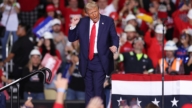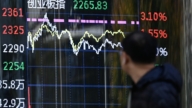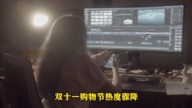【新唐人2014年02月10日讯】由于中共实行人民币浮动和紧盯美元的汇率制度,并拒绝开放资本项目,外界普遍认为,这构筑了抵挡资本外流的防火墙。但随着利用人民币进行套利交易的热钱越来越多的涌入中国,证明中共这道经济防火墙失灵,同时还暴露了中共经济的其他弱点。下面请看报导。
美国《华尔街日报》2月6号发表文章认为,中共封闭的金融系统,目地是用来防范短期外国资本的,可实际上利用人民币进行套利交易的热钱,越来越多的涌入中国,中共严控货币的政策没有起到有效作用。
香港银行业根据对中国大陆银行的求偿权,估计出这些短期外国资本为2万3000亿港元(约合2,950亿美元),比2012年年底增加53%。
大陆金融分析师任中道:“钱荒的原因导致有套利的机会,银行之间的互相拆借很高,甚至达到5也好,6也好。美联储维持利率在0.2到0.25,这中间就产生了很大的利差。”
大陆金融分析师任中道表示,热钱的涌入是因为有利可图,但这加大了中国的金融泡沫,特别是把楼市的泡沫吹得更大。
最近的资料显示,去年12月份,北京等一线中国城市的房价同比上涨了20%。
《华尔街日报》指出,随着利用人民币进行套利的热钱越来越多的涌入中国,中共经济的其他弱点也暴露出来:与充满泡沫的房地产市场相连的外汇政策似乎也十分脆弱﹔中国的物价水准使百姓仍然买不起房,制造业缺乏竞争力,而且还使消费支出转移到了海外。
去年12月份,中国出口增速已经降到4%,这是因为人民币升值后生产成本也相应提高。如,近来的报告显示,在天津生产空中客车(Airbus) A320飞机的成本,比在法国图卢兹(Toulouse)的成本还要高出10%。
事实上,今年中国1月份的国内服务业,增幅也降到最近五年的最低点。
《华尔街日报》的文章还表示,由于中国多年来高通胀并且税负名目繁多,中国人似乎乐意用海外消费取代国内消费。
统计资料显示,早在2012年,中国游客境外消费总额达1020亿美元。在2013年圣诞和2014年新年,中国消费者在英国的平均单笔交易,不少于1400英镑,为了抢到心仪的商品,许多消费者甚至要在寒风中等待将近10个小时。香港在中国新年期间,接待游客800万人次,澳门270万人次,其中多是中国内地游客。
《华尔街日报》指出,这其中会有多少人是因为人民币高估而到香港“血拼”呢?所以,一旦人民币汇率变动体现出中国国际收支状况的恶化时,预计人民币币值就会骤然成为关注焦点。
美国南卡罗来纳大学艾肯商学院教授谢田表示,中共通过“限制国际汇兑”、“操控汇率”、和“限制进出口”这三个办法,造成人民币对内和对外存在两个价格体系。
任中道认为,中国产品出口赚取外汇后,中共“央行”就在国内发行相应数量人民币,是造成人民币两个价格体系的根本原因。
任中道:“它多发了28万亿人民币投入到市场当中,它注定会导致内贬贬的很厉害。”
美国南卡罗来纳大学艾肯商学院教授谢田:“外升内贬的现象,使得中国的老百姓得不到人民币升值带来的好处,反而还要继续承受国内人民币贬值和通货膨胀带来的恶果。实际上就是老百姓的财富就是被政府劫持过去了。”
谢田指出,这也是中共既得利益集团、和特权阶层的利益所在。
《华尔街日报》的结论是,中国的物价将不可避免的在某一阶段经历重大调整。但问题是,调整的形式究竟是人民币汇率变动,还是国内出现严重通缩?
采访/易如 编辑/宋风 后制/萧宇
Wall Street Journal: Chinese Regimes Currency Firewall Failing
China’s crawling peg currency to the US Dollar, and it’s
closed capital account, is believed to have been created
to provide a line of defense to reversals in capital flows.
However, this artificially constructed currency
firewall has revealed it’s fragility as a destination for
“hot money” playing the yuan currency carry trade.
The Wall Street Journal (WSJ) released an
article analyzing China’s closed financial system.
It considers that it was designed to
guard against short-term foreign capital.
However, China’s renewed popularity as a destination
for “hot money” is playing the yuan currency carry trade,
and has exposed its vulnerabilities and lack of effectiveness.
The WSJ reported that, according to claims, Hong Kong
banks have on mainland counterparts give an approximation
of the size of these yield-seeking structured products.
As of October, those claims were a record HK$2.3 trillion
($295 billion), up 53% since the end of 2012.
Ren Zhongdao, Financial Analyst: “Money shortages
create the opportunity for currency carry trade.
Inter-bank lending rates are high, at 5 or 6%, while the
Federal Reserve keeps interest rates at 0.2 to 0.25.
This creates a huge difference in interest rates.”
Financial analyst Ren Zhongdao
explains that hot money pursues profit.
This is at the cost of creating financial bubbles
in China, especially that of a property bubble.
Recent data in December last year showed
that property prices in Beijing and other Chinese
cities had grown 20% year on year, reported WSJ.
There are other vulnerabilities too, exposed by
China’s renewed popularity as a destination for
“hot money” playing the yuan currency carry trade.
At the moment, China’s currency policy twinned with
its bubbly property market appears highly fragile.
You have an economy where prices are
now not just making property unaffordable.
They are making manufacturing uncompetitive and
diverting retail spending overseas, reported the WSJ.
China’s export sector already slowed
to a 4% growth in December.
This was because of high production
costs as the yuan appreciated.
The WSJ said that recent reports suggested
it now costs 10% more to produce the Airbus
A320 in Tianjing than it does in Toulouse.
In January, China’s services-sector
growth has slumped to a five-year low.
WSJ also reported that Chinese are substituting
domestic spending for that overseas.
This comes after years of inflation
and assorted domestic taxes in China.
Statistics show that China’s expenditure on
overseas travel reached US$102 billion in 2012.
Around Christmas 2013, and New Year 2014, the
average Chinese consumer spent £1,400 per transaction.
Many Chinese consumers would wait in the bitter
cold for 10 hours, to grab their favorite products.
During the week-long Chinese New Year holiday,
Hong Kong received more than 8 million tourists.
Macau more than 2.7 million people, many
of whom are mainland Chinese tourists.
WSJ questioned how much of this travel is shopping
arbitrage simply due to an overvalued currency.
It is therefore expected that the level of the yuan will
come sharply into focus, when it starts to show up
in deterioration in China’s balance of payments.
Professor Xie Tian, School of Business, University
of South Carolina Aiken, indicates that the regime
has created a dual RMB pricing systems.
One is the domestic system, and
the other is the international system.
It is based on its restriction measures on international
exchange rates, currency rates, as well as import & export.
Ren Zhongdao analyzes the dual RMB pricing systems
was created because China Central Bank issues relevant
RMB cashes according to the earnings of Chinese exports.
Ren Zhongdao: “An extra 28 trillion yuan into the market
is destined to lead to serious devaluation domestically.”
Professor Xie Tian: “Appreciation internationally
coupled with depreciation domestically only leads
to negative consequences with Chinese inflation.
It is, in fact, the government hijacking people’s wealth.”
Professor Xie indicates that this profit is exactly
what those with vested interests, as well as those
privileged in the regime, have always relied on.
WSJ concludes that, at some stage, it looks inevitable
that prices in China will need a big adjustment.
The question is whether it will come through the
exchange rate or from sharp domestic deflation.
Interview /Yiru Edit/Songfeng Post-Production/Xiaoyu





























